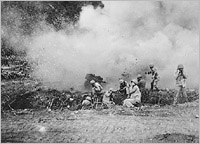 |
 |
 |
|||
 |
Home | Cold War Turns Hot | The Armed Forces Integrate | What the Experts Say | |||
|
The Cold War Turns Hot
"No End To Them"
"They had on these quilted tan or brown uniforms," remembers Herb Dareff of the Army's 24th Division. "I was scared," says Frank Miller of the 1st Marines. "The bugles blew and they were yelling and screaming." Dareff remembers a dark joke that soldiers would tell later. Asked by an officer how many Chinese were coming over the hill, a grunt replies, "Well, a horde." What's a horde? the officer asks. You mean a platoon? A battalion? "No, a horde," Dareff says, delivering the punch line. "That means there's no end to them. There's no end to them." The Chinese Army cut down Americans and their allies by the thousands. Mao's forces lost even more men. "It was the most depressing, extravagant use of human resources I've ever seen," says Haig, who would travel to some of the battle scenes with his boss, General Ned Almond. "The Chinese would attack against a steel wall of heavy fire over and over, and the [Chinese] bodies would be stacked up like cord wood." As ill-clothed as the Americans were for the North Korean cold, the Chinese may have been worse off. Most had no gloves and their shoes were made of cloth with rubber, sneaker-like soles. Many simply froze to death.
A week after the debacle in the North Korean mountains, Vince Krepps returned from the hospital. His 2nd Division had lost almost a third of its men, 5,000 dead and wounded, fighting through a gauntlet near the village of Kunu-ri. "They looked just like they were," Vince says of his surviving mates, "a bunch of defeated men. They call this the 'thousand-mile stare,' when guys have seen more than they can cope with. "And I just kept looking amongst the wounded and the guys for my brother, I was just hoping and praying to…see him there somewhere. And finally it just overwhelmed me." Vince remembers leaning against an M-10 tank, crying, "when two guys came over to me and said, 'Vince, sorry we have to tell you this, but Dick didn't make it out of Kunu-ri. He's missing in action.'" The soldiers tried to reassure Vince that some men were still straggling in, that Richard might turn up yet. And, in fact, Vince would later get encouraging news that would give him hope. But it would take him 48 years to fully learn the fate of his brother. Next: Truman vs. MacArthur
|
||||

